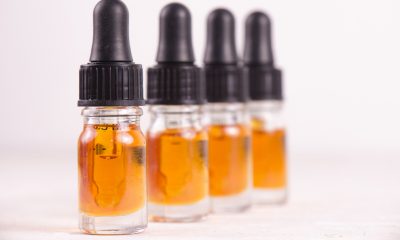The UK has nearly 12 million people aged over 65, amounting to 18% of the total UK population.
Elderly people experience a wide range of health issues, including chronic pain, heart disease, arthritis, osteoporosis and Alzheimer’s. As CBD becomes more widely accepted as a supplement, people of all ages, including pensioners, are turning to the compound to help manage their condition.
A growing body of research has found that cannabidiol (CBD), may have the potential to treat a wide spectrum of common health conditions experienced by older people.
CBD comes in various forms. The most common is CBD oil which can be taken orally or sublingually, which means it is dissolved beneath the tongue.
Another popular choice for elderly people, especially those experiencing pain, is topical and transdermal products which provide targeted pain relief in specific areas by applying creams, ointments or patches to the skin.
Pain is an issue that almost every elderly person will have to deal with. With its anti-inflammatory and analgesic properties, early research into the use of CBD as a treatment for acute and chronic pain is promising.
A 2016 study found that transdermal cannabidiol has potential for reducing pain and inflammation associated with arthritis without any noticeable side effects.
As the body ages, bone density decreases. This can lead to a number of health issues including fractures and bone diseases such as osteoporosis; a condition that causes the bones to become brittle and fragile.
In 2017/18, the NHS revealed that almost 100,000 older people suffered from hip fractures. And according to the Office for National Statistics, 5,048 people aged over 65 died from having a fall in 2017.
Although research remains in its early stages, some studies have demonstrated the potential of cannabinoids, including CBD, for strengthening bones and promoting the healing process.
CBD could also be an effective supplement for decreasing the risk of heart disease, which, in 2019, caused 27% of deaths in the UK. As elderly people are particularly vulnerable to issues with their heart, CBD could prove to be a powerful treatment for older generations.
Recent studies have found that CBD could reduce high blood pressure, which is a common cause of heart disease. In 2017, a small study of ten male patients found that a dose of 600mg of CBD reduced resting blood pressure, however it also noted that “further research is required to establish whether CBD has a role in the treatment of cardiovascular disorders”.
Other studies suggest that the antioxidant properties of CBD could reduce cardiac inflammation and reduce cell death in the heart.
The researchers concluded: “Collectively, these results coupled with the excellent safety and tolerability profile of cannabidiol in humans, strongly suggest that it may have great therapeutic potential in the treatment of diabetic complications, and perhaps other cardiovascular disorders, by attenuating oxidative/nitrosative stress, inflammation, cell death and fibrosis.”
The calming and lifting effects of CBD have also shown potential for improving quality of sleep and for treating mood-related disorders such as anxiety and depression.
Studies have also found that CBD could be effective for treating and preventing the onset of more serious neurodegenerative diseases such as Alzheimer’s and dementia.
Research has found that CBD could help treat people with neurodegenerative conditions by reducing inflammation, reducing oxidative damage and acting as a neuroprotectant.
In the UK, Alzheimer’s Research UK is funding a phase II clinical trial of Sativex, a cannabis-based medication containing both CBD and THC which is currently used for treating multiple sclerosis. The study, which is being carried out by Kings College London scientist, aims to test the feasibility of treating agitation in Alzheimer’s patients.
Speaking to Being Patient, Dag Aarsland, a psychiatrist who is supervising the trial, said: “Current treatments for behavioural and psychiatric symptoms of dementia are very limited, and we desperately need to develop alternatives. Doctors sometimes prescribe antipsychotic medications, and while these drugs can have important benefits, these need to be weighed against the risk of very serious side effects.”
CBD is currently a relatively understudied treatment and although, early studies show great potential for the compound, it is important for elderly people to consult a doctor before using CBD to ensure it doesn’t interfere with any other medications that they are using.

 News6 months ago
News6 months ago
 News6 months ago
News6 months ago
 News6 months ago
News6 months ago
 Science5 months ago
Science5 months ago
 Industry5 months ago
Industry5 months ago
 News6 months ago
News6 months ago
 Medical cannabis6 months ago
Medical cannabis6 months ago
 News5 months ago
News5 months ago












